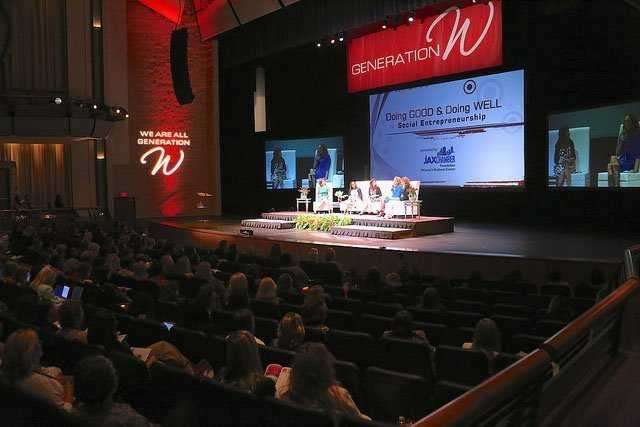By Sandy Strickland
The Florida Times-Union, Jacksonville.
In the next decade, expect to see more women in the boardroom, in congressional chambers, in decision-making roles and navigating the corporate jungle gym. At the same time, you may see a downturn in the degree of violence toward women.
That’s what some participants in this year’s Generation W conference see as realistic goals for women in coming years. The daylong women’s leadership conference seeks to inspire, connect and educate women to be a catalyst for change.
“Passion & Purpose, the theme of this year’s meeting of the minds, is meant to have every attendee buzzing with promise and excitement about their future and the difference they can make in this world,” said Donna Orender, who founded the conference in 2012.
Gender equity will be a focal point, said Orender, who played professional basketball, worked for the PGA Tour and now has a consulting business. Recent studies indicate that companies with even one female director outperform those with none, the Jacksonville Beach resident said.
“Gender equality is good for men as well,” Orender said. “Men want to be engaged in their kids’ lives, and research is proving it has an ongoing and lasting impact on men and their families. Dads of daughters do not want their daughters to have any ceilings.”
Studies also show that women make up 5 percent of Fortune 500 CEOs, 20 percent of corporate board seats and 20 percent of U.S. Senate seats, said speaker Kelly Wallace, a CNN digital correspondent and editor at large covering family, career and life.
“My hope, my goal, my dream is increasing all of those numbers significantly,” said the New York-based speaker. “I’d be happy to get to 50 percent. As the mom of two daughters, I want them to have an equal playing field with boys and young men.”
While there’s a long way to go to make that a reality, Wallace said, it’s important to continue taking steps to reduce the imbalance.
Speaker Lisa Shalett, a corporate board director and Goldman Sachs retired partner, has been traveling from New York for three years to take part in the conference. She sees one of the most important goals as having more female role models and greater representation in leadership roles, including corporate senior management, politics, policy, technology, entrepreneurship, the boardroom, media and pop culture.
“Having the seat at the table is so crucially important, and women should feel confident in seeking and taking that seat, even if [she is] the only woman in the room,” Shalett said. “Seeing more women in these kinds of roles brings more diverse thinking to decision making about what makes a great leader and encourages women to feel these roles are attainable. You can’t be what you can’t see.”
Women should do more to bring men into the conversation, and men need to take more initiative themselves, she said.
“The business case here is strong. Too often these conversations occur only among women, as if women need to solve these issues themselves,” Shalett said.
Another short-term goal that she said is not talked about often enough is for women to recognize other ways to be influential. For example, Shalett said, more women can be angel investors and help support entrepreneurs and innovative ideas. And they don’t have to write a huge check to do so, she said.
“More women can bring terrific talent and experience to advise startups or serve on private company boards, where their experience would be valued and in turn, provide them with valuable board experience,” Shalett said.
Another feasible goal is reducing the culture of violence against women, a subject that will be discussed by both a national and local panel.
“It is the kind of issue that you want to diminish tomorrow, but the first step is to understand what’s allowing this to happen, how we begin to understand change and what we can do,” Orender said.
In a recent global review of violence against women, the United Nations reported that about a third of women have been victims of some type of violence, she said. In addition, Orender said, a different study found that one of every five young women on a college campus will be a victim of relationship violence.
Ellen Siler, CEO of Hubbard House and a panel participant, said she would like to see a time when violence against women becomes so rare that the community is shocked when it happens. In tandem with that, she envisions a time when women aren’t blamed for being a crime victim. Like other participants interviewed, she would like to see gender equity, a time when young women take for granted being treated as equals.
Sheila Spivey, director of UNF’s Women’s Center, said she looks toward a time when women’s concerns are viewed as human issues and feels that we are moving toward an egalitarian society.
Stacey Hubbard, senior vice president of U.S. operations for Weight Watchers International, said she thinks women will be increasingly using technology as an additional way to connect with people who will support them in achieving their goals.
“A sense of community will continue to play a key role in women’s efforts to lead a healthier life — physically, mentally, financially or in whatever sense ‘healthier’ means the most to them,” said Hubbard, who is from Oxfordshire, England. “How that community looks and feels will become ever more personalized and customized to fit women’s individual lifestyles on their terms.”














































































































































































































































































































































































